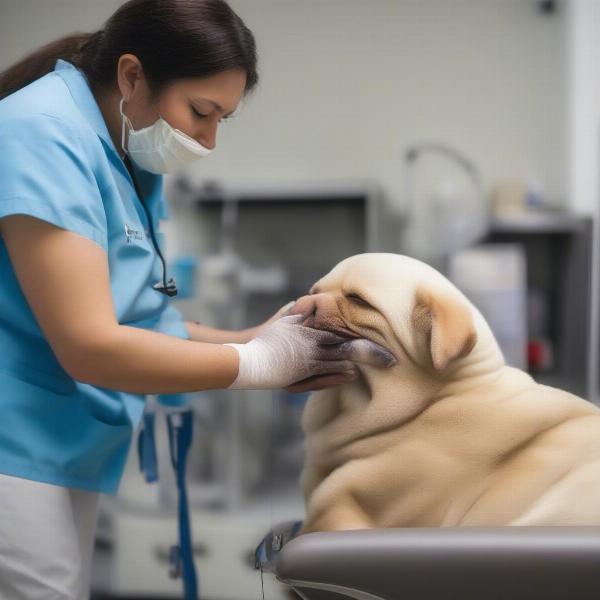Dog face swelling on one side can be a worrying sight for any pet owner. This asymmetry can range from a mild puffiness to a dramatic distortion, and understanding the potential causes is crucial for seeking appropriate veterinary care. Several factors, from insect bites to infections and even tumors, can contribute to this condition. This article will explore the common reasons behind unilateral facial swelling in dogs, the associated symptoms, and the necessary steps to take if you notice this issue in your furry friend.
Understanding the Causes of One-Sided Facial Swelling in Dogs
Several factors can cause swelling on one side of a dog’s face. Identifying the underlying cause is critical for effective treatment. Common causes include:
- Insect Bites or Stings: Reactions to bee stings, wasp stings, spider bites, or other insect bites can cause localized swelling, often rapidly. The area may be painful, red, and warm to the touch.
- Abscesses: A bacterial infection can lead to a pocket of pus, known as an abscess, forming under the skin. These often appear as a firm, painful swelling.
- Dental Issues: Infections in the teeth or gums can cause swelling that may seem to affect only one side of the face. Bad breath, difficulty eating, and pawing at the mouth are other potential signs.
- Trauma: An injury to the face, such as a bite wound or blunt force trauma, can result in swelling and bruising.
- Tumors: While less common, tumors can also cause facial swelling in dogs. These growths can be benign or cancerous and may require further investigation.
- Salivary Gland Issues: Problems with the salivary glands, such as blockages or infections, can lead to swelling under the jaw or around the ears.
Recognizing the Symptoms
Beyond the noticeable swelling, other symptoms can accompany one-sided facial swelling in dogs. These can include:
- Pain or Discomfort: The affected area may be tender to the touch. Your dog might whine, whimper, or avoid having their face touched.
- Redness and Heat: The swollen area may appear red and feel warmer than the surrounding skin.
- Difficulty Eating or Drinking: Swelling can make it difficult for your dog to open their mouth or swallow comfortably.
- Drooling: Excessive drooling can be a sign of pain, discomfort, or difficulty swallowing.
- Lethargy: Your dog might seem less energetic or playful than usual.
- Changes in Behavior: Your dog might become withdrawn, irritable, or aggressive due to pain or discomfort.
Seeking Veterinary Care for Dog Face Swelling
If you notice any swelling on your dog’s face, it’s essential to consult a veterinarian as soon as possible. While some causes, like mild insect bites, might resolve on their own, others require prompt medical attention.
The veterinarian will perform a physical examination and may recommend further diagnostic tests, such as blood work, X-rays, or ultrasound, to determine the underlying cause of the swelling. Treatment will depend on the diagnosis and may include antibiotics, anti-inflammatory medications, pain relief, or even surgery in some cases.
 Dog Undergoing Veterinary Exam for Facial Swelling
Dog Undergoing Veterinary Exam for Facial Swelling
When to Seek Emergency Veterinary Care
While most cases of facial swelling can be addressed during regular veterinary hours, some situations warrant immediate emergency care. These include:
- Difficulty Breathing: Swelling that obstructs the airways can be life-threatening.
- Sudden and Severe Swelling: Rapidly progressing swelling can indicate a severe allergic reaction.
- Signs of Anaphylaxis: Symptoms like vomiting, diarrhea, collapse, or pale gums require immediate veterinary attention.
- Severe Pain: If your dog is in extreme pain, seek emergency care.
Conclusion
Dog face swelling on one side can have various causes, from minor insect bites to more serious underlying conditions. Prompt veterinary attention is crucial for accurate diagnosis and effective treatment. By understanding the potential causes, recognizing the symptoms, and seeking timely veterinary care, you can help ensure your dog’s health and well-being. Don’t hesitate to contact your vet if you have any concerns about your dog’s facial swelling.
FAQ
- Can I treat my dog’s facial swelling at home? No, it’s essential to consult a veterinarian for diagnosis and treatment before attempting any home remedies.
- Is facial swelling in dogs always a sign of a serious problem? Not necessarily, but it’s always best to have it checked by a vet to rule out any underlying medical conditions.
- How long does it take for facial swelling in dogs to go down? The recovery time depends on the cause and the treatment. Mild swelling might subside within a few days, while more severe cases could take longer.
- What are the potential complications of untreated facial swelling in dogs? Untreated swelling can lead to breathing difficulties, worsening infections, and other serious health issues.
- How can I prevent facial swelling in my dog? Preventive measures can include regular dental care, parasite prevention, and avoiding contact with known allergens or irritants.
how do i know if my dog broke his leg
side effects of vaccines in dogs
ILM Dog is your trusted international resource for all things dog-related. We offer expert advice on dog breeds, health, training, nutrition, grooming, and much more. From puppy care to senior dog support, we’re here to help you provide the best possible care for your furry friend. For personalized guidance or further information, contact us at [email protected] or call us at +44 20-3965-8624. Visit ILM Dog for comprehensive resources and expert insights on dog care.